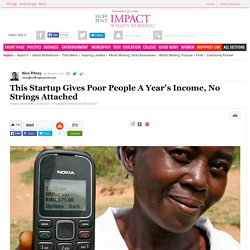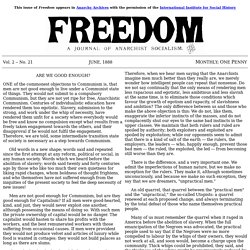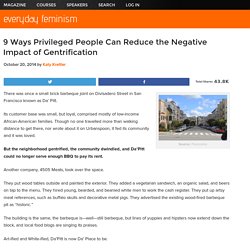

This Startup Gives Poor People A Year's Income, No Strings Attached. (Photo: GiveDirectly) A person whom Teresa had never met showed up at her home one day with a remarkable offer.

Teresa and her family would receive what amounted to a year's income, in cash. Nothing was owed in return. She did not have to repay the money, and her family could spend it however they wished. Teresa was at a loss. This scenario has played out thousands of times. Yet, dollar-for-dollar, analysts say GiveDirectly is among the most effective organizations in the world trying to eliminate extreme poverty. Freedom21. "Forsooth, he that waketh in hell and feeleth his heart fail him, shall have memory of the merry days of earth, and how that when his heart failed him there, he cried on his fellow, were it his wife or his son, or his brother or his gossip, or his brother sworn in arms, and how that his fellow heard him and came, and they mourned together under the sun, till again they laughed together and were but half sorry between them.

None of the world’s top industries would be profitable if they paid for the natural capital they use. The notion of “externalities” has become familiar in environmental circles.

It refers to costs imposed by businesses that are not paid for by those businesses. For instance, industrial processes can put pollutants in the air that increase public health costs, but the public, not the polluting businesses, picks up the tab. In this way, businesses privatize profits and publicize costs. While the notion is incredibly useful, especially in folding ecological concerns into economics, I’ve always had my reservations about it. Environmentalists these days love speaking in the language of economics — it makes them sound Serious — but I worry that wrapping this notion in a bloodless technical term tends to have a narcotizing effect. To see what I mean, check out a recent report [PDF] done by environmental consultancy Trucost on behalf of The Economics of Ecosystems and Biodiversity (TEEB) program sponsored by United Nations Environmental Program.
9 Ways We Can Make Social Justice Movements Less Elitist and More Accessible. By Kai Cheng Thom / everydayfeminism.com In my first year of college, I stopped calling myself an activist.

It took attending just a few meetings of the campus queer group for me to realize that I didn’t fit in with everyone else. Despite that the fact that I was definitely queer – a pre-transition trans woman at the time – I could tell immediately that I wasn’t “queer enough” to fight for social justice alongside these university-educated revolutionaries who spoke with such confidence and rolled their eyes every time I opened my mouth. 9 Ways Privileged People Can Reduce the Negative Impact of Gentrification.
There was once a small brick barbeque joint on Divisadero Street in San Francisco known as Da’ Pitt.

Its customer base was small, but loyal, comprised mostly of low-income African-American families. Though no one travelled more than walking distance to get there, nor wrote about it on Urbanspoon, it fed its community and it was loved. But the neighborhood gentrified, the community dwindled, and Da’Pitt could no longer serve enough BBQ to pay its rent. Another company, 4505 Meats, took over the space.
They put wood tables outside and painted the exterior. The building is the same, the barbeque is—well—still barbeque, but lines of yuppies and hipsters now extend down the block, and local food blogs are singing its praises. Art-ified and White-ified, Da’Pitt is now Da’ Place to be. And so is the rest of the block. The city’s “deadliest neighborhood” in 2005 became its “comeback neighborhood” in 2011. 3 Common Myths About Gentrification – And the Facts That Prove We Need to Stop It.
In New York, San Francisco, Chicago, other major cites across the country, people are talking about gentrification.

Recently, I’ve been speaking to people randomly about gentrification, one thing I learned, is that people have generally heard the term, but they’re not quite familiar with what it exactly means. One guy said, “Isn’t that when neighborhoods become new? Or is when they’re old, and they get kind of revitalized?” Our understandings of gentrification are quite confused. Defining gentrification merely as neighborhood improvement is overly simplistic.
The rich get government handouts just like the poor. Here are 10 of them. A floating tax shelter photographed in its natural habitat.

Flickr user "OVER 1 MILLION VIEWS", CC. In case you are still skeptical that many of the non-poor — and, in fact, a lot of the rich — receive benefits from government, too (for which we don't make them pee in a cup or promise not to buy luxuries), we've rounded up some more examples below. 1. The mortgage interest deduction for big houses and second homes. Thanks to this tax break, the 5 million households in America making more than $200,000 a year get a lot more housing aid than the 20 million households living on less than $20,000. 2.